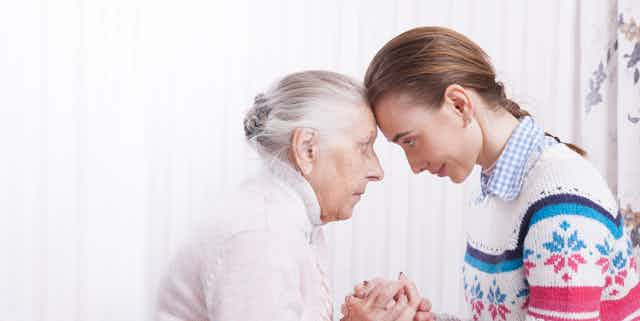There are around 700,000 young carers across the UK looking after a parent or a family member. In Glasgow, these young people make up around 12% of children aged 11-18, and now a new study has found that their duties and responsibilities are preventing around half of them from going on to university or college after school.
According to a 2014 NHS survey of 11,000 pupils across the city, one in eight secondary school-age pupils in Glasgow is providing care for someone at home. Not only do these pupils care for someone with a disability, long-term illness, mental health or substance issue, they also have poorer outcomes for their own health and future expectations.
Our new study for the Glasgow Centre for Population Health (GCPH) found that when asked what they thought they would do once they had left school, young carers were almost 50% less likely to say that they thought they would go on to university or college when compared with pupils who had no caring duties.
The type of care given by young carers can vary considerably, from doing household chores to physical assistance, such as moving or lifting, to more intimate care, such as washing, dressing and help with going to the toilet, and providing emotional support.

Low expectations
That carers – and young carers generally – are more likely to be found in deprived areas and in low-income families shows how caring has become associated with, and compounded by, other forms of disadvantage. Data from the 2011 Census shows the prevalence of caring in Scotland to be higher in West Central Scotland, the area with the largest concentration of deprivation. Glasgow also has higher than average levels of long-term sick or disabled adults, problem drug use, and alcohol-related deaths.
Previous research has found that young people in lone-parent families are also more likely to become young carers, and with 40% of households with dependent children in Glasgow headed by a single parent, it is perhaps unsurprising that the numbers are so high.
As well as facing economic disadvantage, our study also found that carers had poorer physical and mental health. The association with mental health and emotional and behavioural difficulties was especially strong for the quarter of young carers looking after someone with a mental health problem, and the 10% caring for someone with a drug or alcohol problem.
The hidden carers
The attainment gap between richer and poorer students has long been recognised, and strategies such as the Scottish Attainment Challenge from the Scottish government aim to make a difference by channelling more money into schools.
But low attainment isn’t just about poverty – it’s also about young people not having the confidence, opportunities or the freedom to choose and shape their future. Young carers can be bound geographically, physically and in terms of their time, all of which have an impact on what they think they can do when they leave school.
Previous research has found that not only do young carers tend to have poorer educational achievements, but employment and education decisions are made within the context and constraints of their caring role, often limiting their options and stunting their ambitions.

These young carers are not just experiencing multiple disadvantages, a third of them are also, our study found, struggling along without anyone outside the family knowing about their caring role. This may go some way to explaining the higher prevalence found in our study – 12% – which was higher than previous estimates.
The discrepancy between the high prevalence found in our report and the lower official figures could be down to many reasons. Some of those defined as young carers don’t actually realise that they are providing care, and many do not know that there is support available. Others may choose to conceal their carer status due to fears around the stigma of caring, and others may be afraid of outside intervention if anyone discovers their role at home.
The type of care that they are providing can also have an impact on the number of hidden carers. Those with family members with more stigmatised conditions such as mental health or substance issues may fear the consequences if their status is revealed.
Rights of the child?
The United Nations Convention on the Rights of the Child (UNCRC) outlines some general rights for children, such as every child has the right to a happy life and develop to the maximum extent possible, as well as recognising that they need guidance and space to be young people and to learn, play and enjoy positive futures. Our findings suggest that being a young carer can impact negatively on these rights.
The introduction of the Carers (Scotland) Act (2016) means that by April 2018, local authorities and health boards will have a duty to provide Young Carer “statements”, which will identify support needs and personal goals and development. This will be an important opportunity to ensure that all young carers are supported enough to have the chance to realise their full potential.

